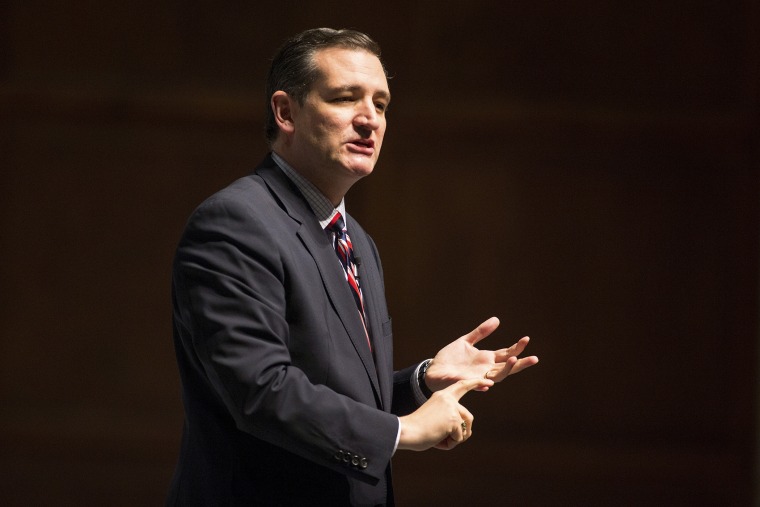The number of Republican presidential candidates opposed to birthright citizenship -- the 14th Amendment's constitutional principle that if you're born in the United States, you're a citizen of the United States --
just keeps growing.
[Sen. Ted Cruz], in an interview on the Michael Medved radio show, made his position clear: "We should end granting automatic birthright citizenship to the children of those who are here illegally." The presidential candidate acknowledged that a change in the law would be a heavy lift, saying "I think it is possible, but any constitutional amendment by its nature is difficult to achieve."
Acknowledging Donald Trump's role in adding the issue of birthright citizenship to the fight for the Republican nomination, the Texas senator said, "I welcome Donald Trump articulating this view. It is a view I have long held."
It's worth clarifying, though that Cruz seems to believe it's time to amend the Constitution to alter the 14th Amendment's guarantee, while Trump
believes in passing laws that challenge the 14th Amendment in the courts.
Stepping back, and referencing
this helpful piece from Bloomberg Politics, we can start breaking up the massive GOP 2016 field into some factions on the issue of birthright citizenship.
1. Those who've expressed unambiguous opposition to birthright citizenship: Donald Trump, Ted Cruz, Ben Carson, Lindsey Graham, Mike Huckabee, Rand Paul, Rick Santorum, Bobby Jindal
2. Those who were opposed, but who've since hedged a bit: Scott Walker
3. Those who are open to changing the law related to birthright citizenship: Chris Christie, Carly Fiorina [updated, see below]
4. Those who support birthright citizenship: Jeb Bush, Marco Rubio, John Kasich, Jim Gilmore, and George Pataki
5. Those who just don't want to talk about it: Rick Perry
Realistically, will Republicans actually be able to scrap the constitutional principle?
It's unlikely. If they pursue a constitutional amendment, the effort would almost certainly fail. The right is more likely to try its luck in the courts, counting on some far-right jurists to rule conservatives' way, but this is a long shot, too -- the Supreme Court has upheld the 14th Amendment's principles more than once. Scalia & Co. are admittedly unpredictable, but the odds of the courts undoing 150 years of law for no reason are remote.
With this in mind, why does the controversy matter? First, I tend to think it's noteworthy anytime ideas like these make the transition from the political fringe to the Republican "mainstream." The far-right idea of challenging birthright citizenship isn't new, exactly, but the idea of this being embraced by so many GOP presidential candidates is new. It's relevant evidence of the party's radicalization.
No modern Republican nominee has made this a part of his national agenda. In 2016, that may well change.
And second, NBC News' First Read, reflecting on the "Birthright Citizens' Brigade" yesterday, made
a compelling case that this has all the makings of an important general-election issue.
So how could birthright citizenship play out 14 months from now? Liberal writer Paul Waldman takes a stab at envisioning a hypothetical TV ad Democrats could air on Spanish-language media: "My name is Lisa Hernandez. I was born in California, grew up there. I was valedictorian of my high school class, graduated from Yale, and now I'm in medical school; I'm going to be a pediatrician. But now Scott Walker and the Republicans say that because my mom is undocumented, that I'm not a real American and I shouldn't be a citizen. I'm living the American Dream, but they want to take it away from me and people like me. Well I've got a message for you, Governor Walker. I'm every bit as American as your children. This country isn't about who your parents were, it's about everybody having a chance to work hard, achieve, and contribute to our future. It seems like some people forgot that." As many readers of "First Thoughts" know all too well, there's no path to the White House for the GOP if their nominee can't at least come close to 35% of the Hispanic vote. And ending birthright citizenship could easily turn into the wedge issue NEXT fall, a la Todd Akin.
Watch this space.
Update: A Fiorina campaign official disagrees with the characterization that Fiorina is open to changing the law related to birthright citizenship.
On Monday, asked about the principle, Fiorina
replied, “Well, you know, we should talk about what it would take to get it changed. It would take passing a constitutional amendment to get that changed. This is part of the 14th amendment. And, so, honestly I think we should put all of our energies, all of our political will over finally getting the border secured and fixing the legal immigration system.”
Does that mean Fiorina supports or opposes the constitutional principle? Is she open to changes? I asked the campaign to clarify., but a Fiorina aide refused to say what her specific position is. I offered to update this piece if the campaign changes its mind.
